BUSN20017: Reflective Essay on Developing Communication Competency
VerifiedAdded on 2023/06/04
|7
|2175
|418
Essay
AI Summary
This essay is a reflective practice assignment focusing on the development of communication competency. It summarizes key concepts learned over ten weeks, including the importance of effective communication in business, non-verbal communication, written communication, academic essay writing, vocational presentations, intercultural communication, organizational communication, meetings, and interpersonal communication. The essay includes a literature review on effective business communication, highlighting elements such as conciseness, clarity, and confidence. It also discusses the application of intercultural communication and academic writing skills for future career aspirations, emphasizing their relevance in negotiations and professional business writing. The essay concludes by reinforcing the significance of these modules in enhancing communication competence and preparing the author for future career growth. The document is available on Desklib, a platform offering study tools and resources for students.
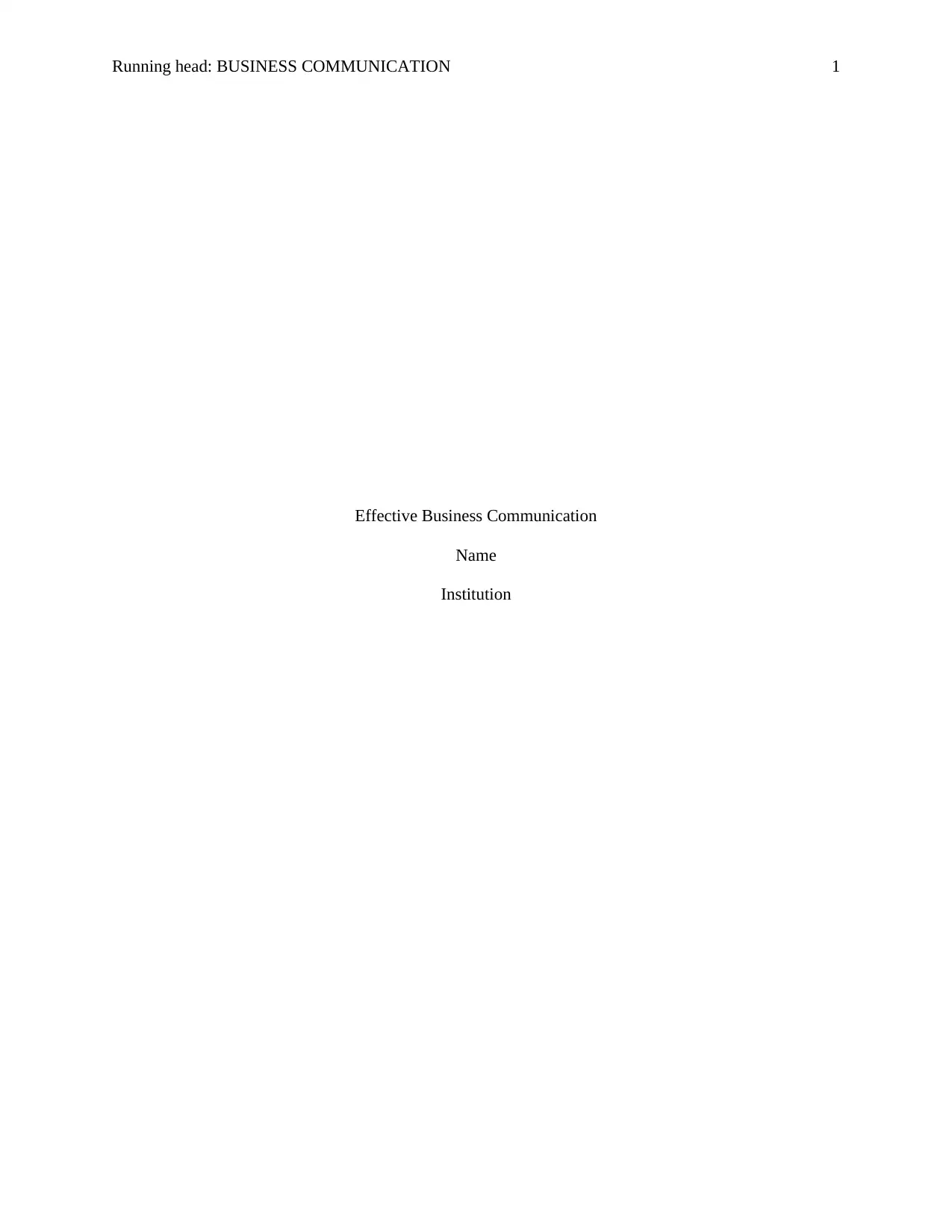
Running head: BUSINESS COMMUNICATION 1
Effective Business Communication
Name
Institution
Effective Business Communication
Name
Institution
Paraphrase This Document
Need a fresh take? Get an instant paraphrase of this document with our AI Paraphraser
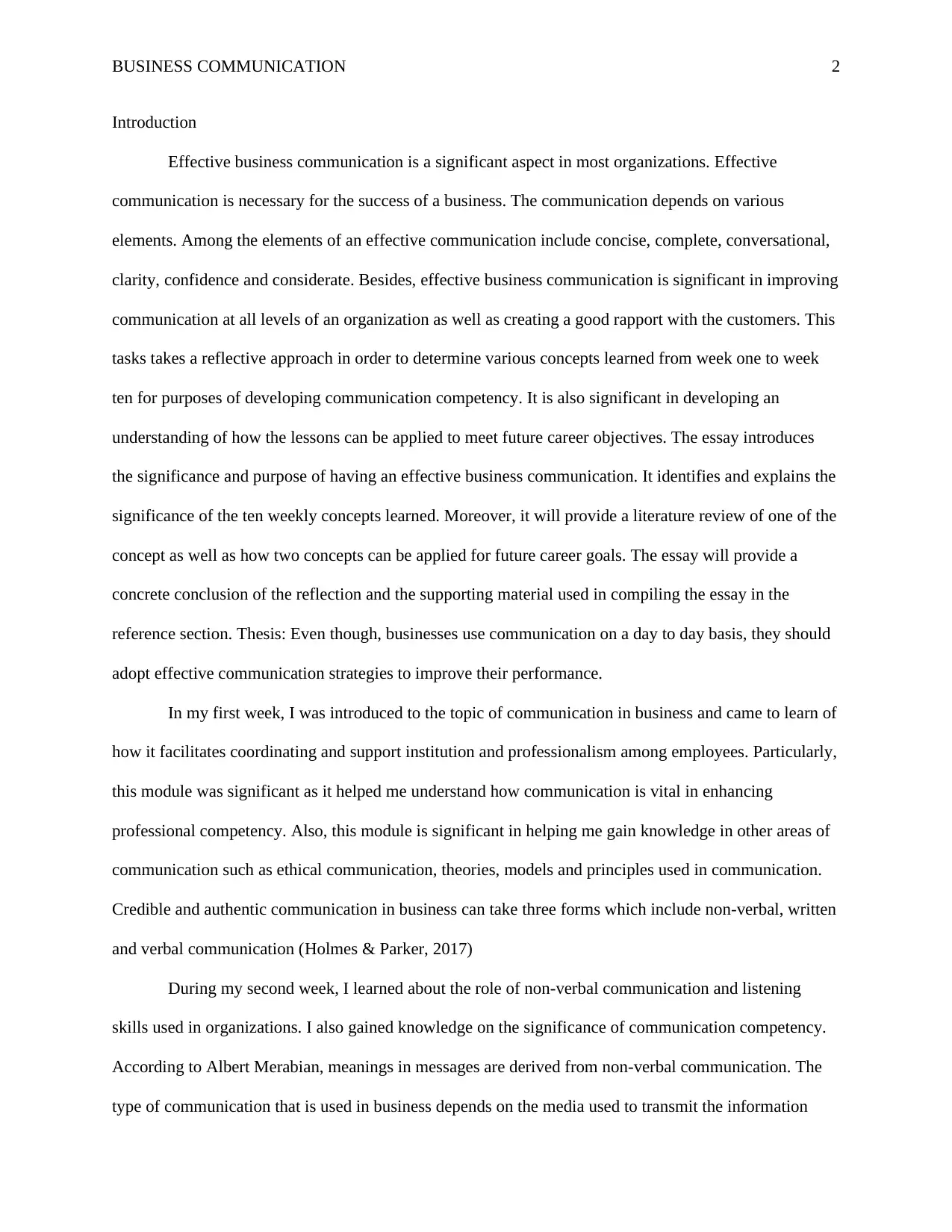
BUSINESS COMMUNICATION 2
Introduction
Effective business communication is a significant aspect in most organizations. Effective
communication is necessary for the success of a business. The communication depends on various
elements. Among the elements of an effective communication include concise, complete, conversational,
clarity, confidence and considerate. Besides, effective business communication is significant in improving
communication at all levels of an organization as well as creating a good rapport with the customers. This
tasks takes a reflective approach in order to determine various concepts learned from week one to week
ten for purposes of developing communication competency. It is also significant in developing an
understanding of how the lessons can be applied to meet future career objectives. The essay introduces
the significance and purpose of having an effective business communication. It identifies and explains the
significance of the ten weekly concepts learned. Moreover, it will provide a literature review of one of the
concept as well as how two concepts can be applied for future career goals. The essay will provide a
concrete conclusion of the reflection and the supporting material used in compiling the essay in the
reference section. Thesis: Even though, businesses use communication on a day to day basis, they should
adopt effective communication strategies to improve their performance.
In my first week, I was introduced to the topic of communication in business and came to learn of
how it facilitates coordinating and support institution and professionalism among employees. Particularly,
this module was significant as it helped me understand how communication is vital in enhancing
professional competency. Also, this module is significant in helping me gain knowledge in other areas of
communication such as ethical communication, theories, models and principles used in communication.
Credible and authentic communication in business can take three forms which include non-verbal, written
and verbal communication (Holmes & Parker, 2017)
During my second week, I learned about the role of non-verbal communication and listening
skills used in organizations. I also gained knowledge on the significance of communication competency.
According to Albert Merabian, meanings in messages are derived from non-verbal communication. The
type of communication that is used in business depends on the media used to transmit the information
Introduction
Effective business communication is a significant aspect in most organizations. Effective
communication is necessary for the success of a business. The communication depends on various
elements. Among the elements of an effective communication include concise, complete, conversational,
clarity, confidence and considerate. Besides, effective business communication is significant in improving
communication at all levels of an organization as well as creating a good rapport with the customers. This
tasks takes a reflective approach in order to determine various concepts learned from week one to week
ten for purposes of developing communication competency. It is also significant in developing an
understanding of how the lessons can be applied to meet future career objectives. The essay introduces
the significance and purpose of having an effective business communication. It identifies and explains the
significance of the ten weekly concepts learned. Moreover, it will provide a literature review of one of the
concept as well as how two concepts can be applied for future career goals. The essay will provide a
concrete conclusion of the reflection and the supporting material used in compiling the essay in the
reference section. Thesis: Even though, businesses use communication on a day to day basis, they should
adopt effective communication strategies to improve their performance.
In my first week, I was introduced to the topic of communication in business and came to learn of
how it facilitates coordinating and support institution and professionalism among employees. Particularly,
this module was significant as it helped me understand how communication is vital in enhancing
professional competency. Also, this module is significant in helping me gain knowledge in other areas of
communication such as ethical communication, theories, models and principles used in communication.
Credible and authentic communication in business can take three forms which include non-verbal, written
and verbal communication (Holmes & Parker, 2017)
During my second week, I learned about the role of non-verbal communication and listening
skills used in organizations. I also gained knowledge on the significance of communication competency.
According to Albert Merabian, meanings in messages are derived from non-verbal communication. The
type of communication that is used in business depends on the media used to transmit the information
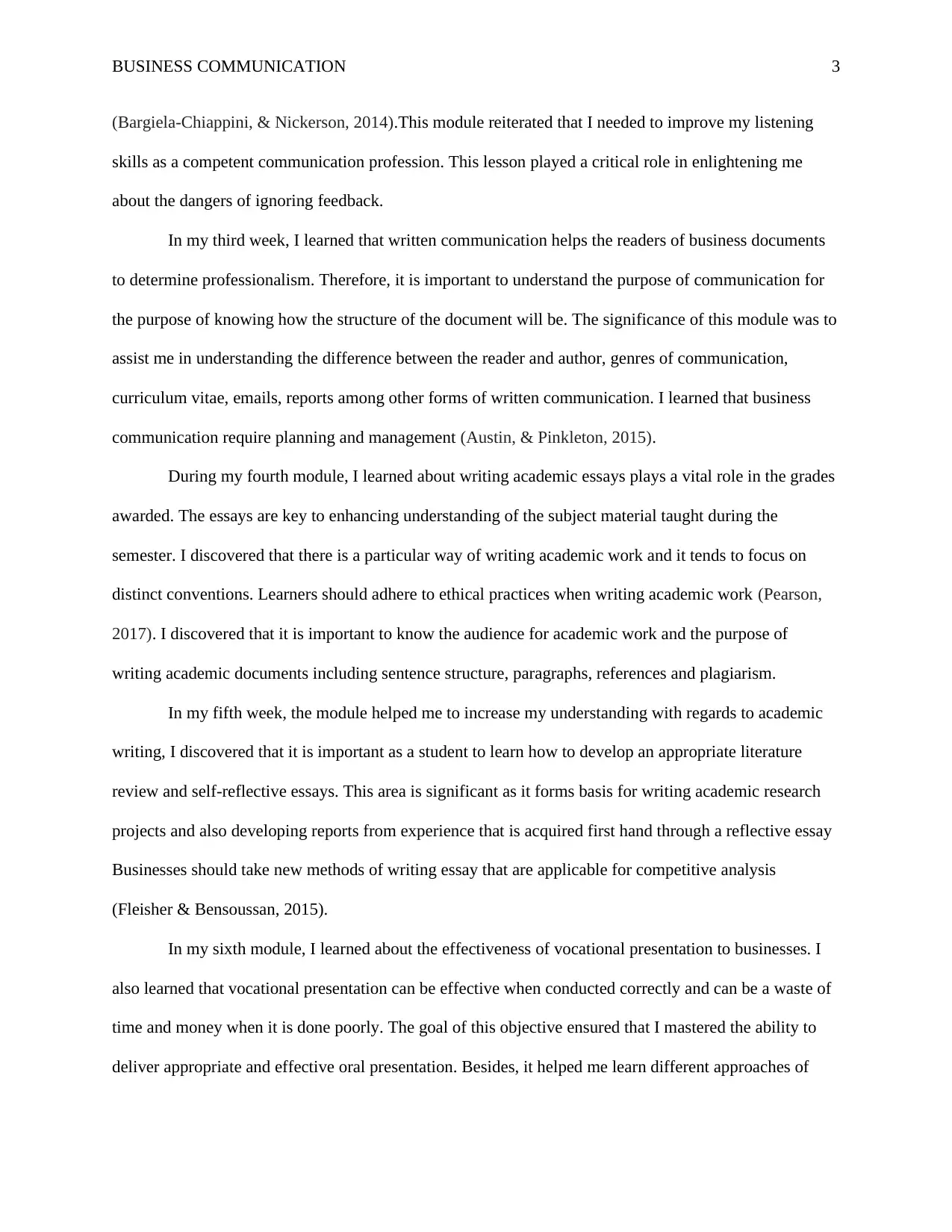
BUSINESS COMMUNICATION 3
(Bargiela-Chiappini, & Nickerson, 2014).This module reiterated that I needed to improve my listening
skills as a competent communication profession. This lesson played a critical role in enlightening me
about the dangers of ignoring feedback.
In my third week, I learned that written communication helps the readers of business documents
to determine professionalism. Therefore, it is important to understand the purpose of communication for
the purpose of knowing how the structure of the document will be. The significance of this module was to
assist me in understanding the difference between the reader and author, genres of communication,
curriculum vitae, emails, reports among other forms of written communication. I learned that business
communication require planning and management (Austin, & Pinkleton, 2015).
During my fourth module, I learned about writing academic essays plays a vital role in the grades
awarded. The essays are key to enhancing understanding of the subject material taught during the
semester. I discovered that there is a particular way of writing academic work and it tends to focus on
distinct conventions. Learners should adhere to ethical practices when writing academic work (Pearson,
2017). I discovered that it is important to know the audience for academic work and the purpose of
writing academic documents including sentence structure, paragraphs, references and plagiarism.
In my fifth week, the module helped me to increase my understanding with regards to academic
writing, I discovered that it is important as a student to learn how to develop an appropriate literature
review and self-reflective essays. This area is significant as it forms basis for writing academic research
projects and also developing reports from experience that is acquired first hand through a reflective essay
Businesses should take new methods of writing essay that are applicable for competitive analysis
(Fleisher & Bensoussan, 2015).
In my sixth module, I learned about the effectiveness of vocational presentation to businesses. I
also learned that vocational presentation can be effective when conducted correctly and can be a waste of
time and money when it is done poorly. The goal of this objective ensured that I mastered the ability to
deliver appropriate and effective oral presentation. Besides, it helped me learn different approaches of
(Bargiela-Chiappini, & Nickerson, 2014).This module reiterated that I needed to improve my listening
skills as a competent communication profession. This lesson played a critical role in enlightening me
about the dangers of ignoring feedback.
In my third week, I learned that written communication helps the readers of business documents
to determine professionalism. Therefore, it is important to understand the purpose of communication for
the purpose of knowing how the structure of the document will be. The significance of this module was to
assist me in understanding the difference between the reader and author, genres of communication,
curriculum vitae, emails, reports among other forms of written communication. I learned that business
communication require planning and management (Austin, & Pinkleton, 2015).
During my fourth module, I learned about writing academic essays plays a vital role in the grades
awarded. The essays are key to enhancing understanding of the subject material taught during the
semester. I discovered that there is a particular way of writing academic work and it tends to focus on
distinct conventions. Learners should adhere to ethical practices when writing academic work (Pearson,
2017). I discovered that it is important to know the audience for academic work and the purpose of
writing academic documents including sentence structure, paragraphs, references and plagiarism.
In my fifth week, the module helped me to increase my understanding with regards to academic
writing, I discovered that it is important as a student to learn how to develop an appropriate literature
review and self-reflective essays. This area is significant as it forms basis for writing academic research
projects and also developing reports from experience that is acquired first hand through a reflective essay
Businesses should take new methods of writing essay that are applicable for competitive analysis
(Fleisher & Bensoussan, 2015).
In my sixth module, I learned about the effectiveness of vocational presentation to businesses. I
also learned that vocational presentation can be effective when conducted correctly and can be a waste of
time and money when it is done poorly. The goal of this objective ensured that I mastered the ability to
deliver appropriate and effective oral presentation. Besides, it helped me learn different approaches of
⊘ This is a preview!⊘
Do you want full access?
Subscribe today to unlock all pages.

Trusted by 1+ million students worldwide
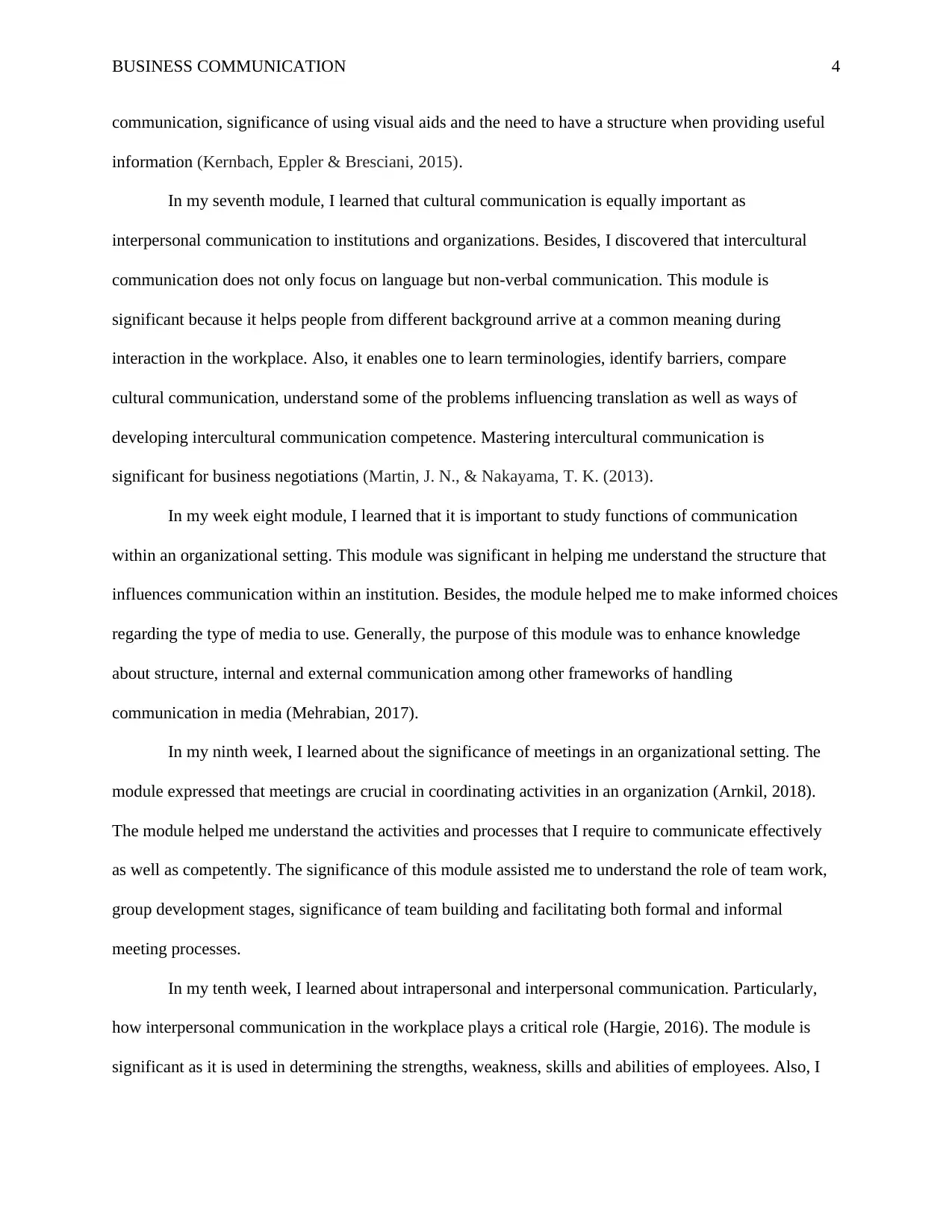
BUSINESS COMMUNICATION 4
communication, significance of using visual aids and the need to have a structure when providing useful
information (Kernbach, Eppler & Bresciani, 2015).
In my seventh module, I learned that cultural communication is equally important as
interpersonal communication to institutions and organizations. Besides, I discovered that intercultural
communication does not only focus on language but non-verbal communication. This module is
significant because it helps people from different background arrive at a common meaning during
interaction in the workplace. Also, it enables one to learn terminologies, identify barriers, compare
cultural communication, understand some of the problems influencing translation as well as ways of
developing intercultural communication competence. Mastering intercultural communication is
significant for business negotiations (Martin, J. N., & Nakayama, T. K. (2013).
In my week eight module, I learned that it is important to study functions of communication
within an organizational setting. This module was significant in helping me understand the structure that
influences communication within an institution. Besides, the module helped me to make informed choices
regarding the type of media to use. Generally, the purpose of this module was to enhance knowledge
about structure, internal and external communication among other frameworks of handling
communication in media (Mehrabian, 2017).
In my ninth week, I learned about the significance of meetings in an organizational setting. The
module expressed that meetings are crucial in coordinating activities in an organization (Arnkil, 2018).
The module helped me understand the activities and processes that I require to communicate effectively
as well as competently. The significance of this module assisted me to understand the role of team work,
group development stages, significance of team building and facilitating both formal and informal
meeting processes.
In my tenth week, I learned about intrapersonal and interpersonal communication. Particularly,
how interpersonal communication in the workplace plays a critical role (Hargie, 2016). The module is
significant as it is used in determining the strengths, weakness, skills and abilities of employees. Also, I
communication, significance of using visual aids and the need to have a structure when providing useful
information (Kernbach, Eppler & Bresciani, 2015).
In my seventh module, I learned that cultural communication is equally important as
interpersonal communication to institutions and organizations. Besides, I discovered that intercultural
communication does not only focus on language but non-verbal communication. This module is
significant because it helps people from different background arrive at a common meaning during
interaction in the workplace. Also, it enables one to learn terminologies, identify barriers, compare
cultural communication, understand some of the problems influencing translation as well as ways of
developing intercultural communication competence. Mastering intercultural communication is
significant for business negotiations (Martin, J. N., & Nakayama, T. K. (2013).
In my week eight module, I learned that it is important to study functions of communication
within an organizational setting. This module was significant in helping me understand the structure that
influences communication within an institution. Besides, the module helped me to make informed choices
regarding the type of media to use. Generally, the purpose of this module was to enhance knowledge
about structure, internal and external communication among other frameworks of handling
communication in media (Mehrabian, 2017).
In my ninth week, I learned about the significance of meetings in an organizational setting. The
module expressed that meetings are crucial in coordinating activities in an organization (Arnkil, 2018).
The module helped me understand the activities and processes that I require to communicate effectively
as well as competently. The significance of this module assisted me to understand the role of team work,
group development stages, significance of team building and facilitating both formal and informal
meeting processes.
In my tenth week, I learned about intrapersonal and interpersonal communication. Particularly,
how interpersonal communication in the workplace plays a critical role (Hargie, 2016). The module is
significant as it is used in determining the strengths, weakness, skills and abilities of employees. Also, I
Paraphrase This Document
Need a fresh take? Get an instant paraphrase of this document with our AI Paraphraser
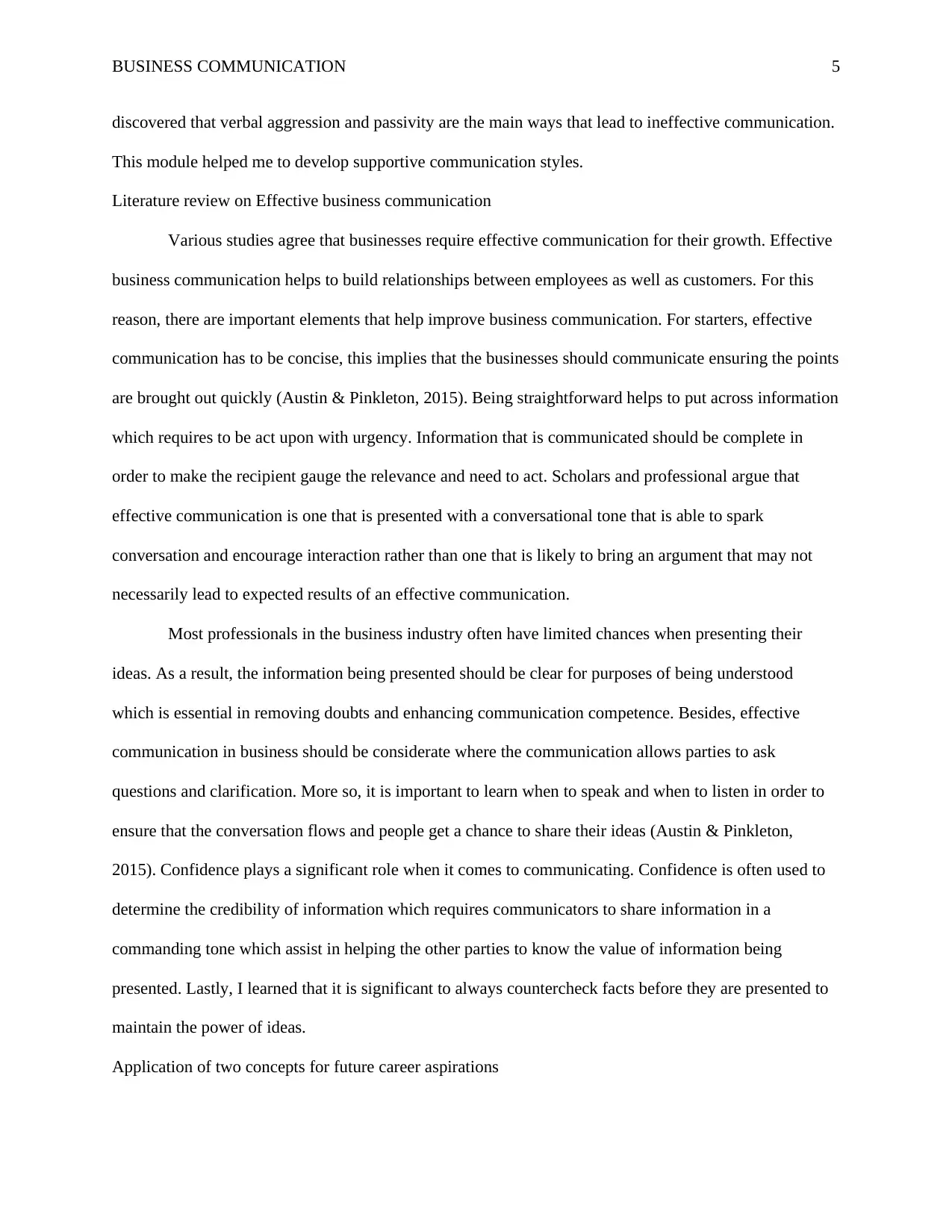
BUSINESS COMMUNICATION 5
discovered that verbal aggression and passivity are the main ways that lead to ineffective communication.
This module helped me to develop supportive communication styles.
Literature review on Effective business communication
Various studies agree that businesses require effective communication for their growth. Effective
business communication helps to build relationships between employees as well as customers. For this
reason, there are important elements that help improve business communication. For starters, effective
communication has to be concise, this implies that the businesses should communicate ensuring the points
are brought out quickly (Austin & Pinkleton, 2015). Being straightforward helps to put across information
which requires to be act upon with urgency. Information that is communicated should be complete in
order to make the recipient gauge the relevance and need to act. Scholars and professional argue that
effective communication is one that is presented with a conversational tone that is able to spark
conversation and encourage interaction rather than one that is likely to bring an argument that may not
necessarily lead to expected results of an effective communication.
Most professionals in the business industry often have limited chances when presenting their
ideas. As a result, the information being presented should be clear for purposes of being understood
which is essential in removing doubts and enhancing communication competence. Besides, effective
communication in business should be considerate where the communication allows parties to ask
questions and clarification. More so, it is important to learn when to speak and when to listen in order to
ensure that the conversation flows and people get a chance to share their ideas (Austin & Pinkleton,
2015). Confidence plays a significant role when it comes to communicating. Confidence is often used to
determine the credibility of information which requires communicators to share information in a
commanding tone which assist in helping the other parties to know the value of information being
presented. Lastly, I learned that it is significant to always countercheck facts before they are presented to
maintain the power of ideas.
Application of two concepts for future career aspirations
discovered that verbal aggression and passivity are the main ways that lead to ineffective communication.
This module helped me to develop supportive communication styles.
Literature review on Effective business communication
Various studies agree that businesses require effective communication for their growth. Effective
business communication helps to build relationships between employees as well as customers. For this
reason, there are important elements that help improve business communication. For starters, effective
communication has to be concise, this implies that the businesses should communicate ensuring the points
are brought out quickly (Austin & Pinkleton, 2015). Being straightforward helps to put across information
which requires to be act upon with urgency. Information that is communicated should be complete in
order to make the recipient gauge the relevance and need to act. Scholars and professional argue that
effective communication is one that is presented with a conversational tone that is able to spark
conversation and encourage interaction rather than one that is likely to bring an argument that may not
necessarily lead to expected results of an effective communication.
Most professionals in the business industry often have limited chances when presenting their
ideas. As a result, the information being presented should be clear for purposes of being understood
which is essential in removing doubts and enhancing communication competence. Besides, effective
communication in business should be considerate where the communication allows parties to ask
questions and clarification. More so, it is important to learn when to speak and when to listen in order to
ensure that the conversation flows and people get a chance to share their ideas (Austin & Pinkleton,
2015). Confidence plays a significant role when it comes to communicating. Confidence is often used to
determine the credibility of information which requires communicators to share information in a
commanding tone which assist in helping the other parties to know the value of information being
presented. Lastly, I learned that it is significant to always countercheck facts before they are presented to
maintain the power of ideas.
Application of two concepts for future career aspirations
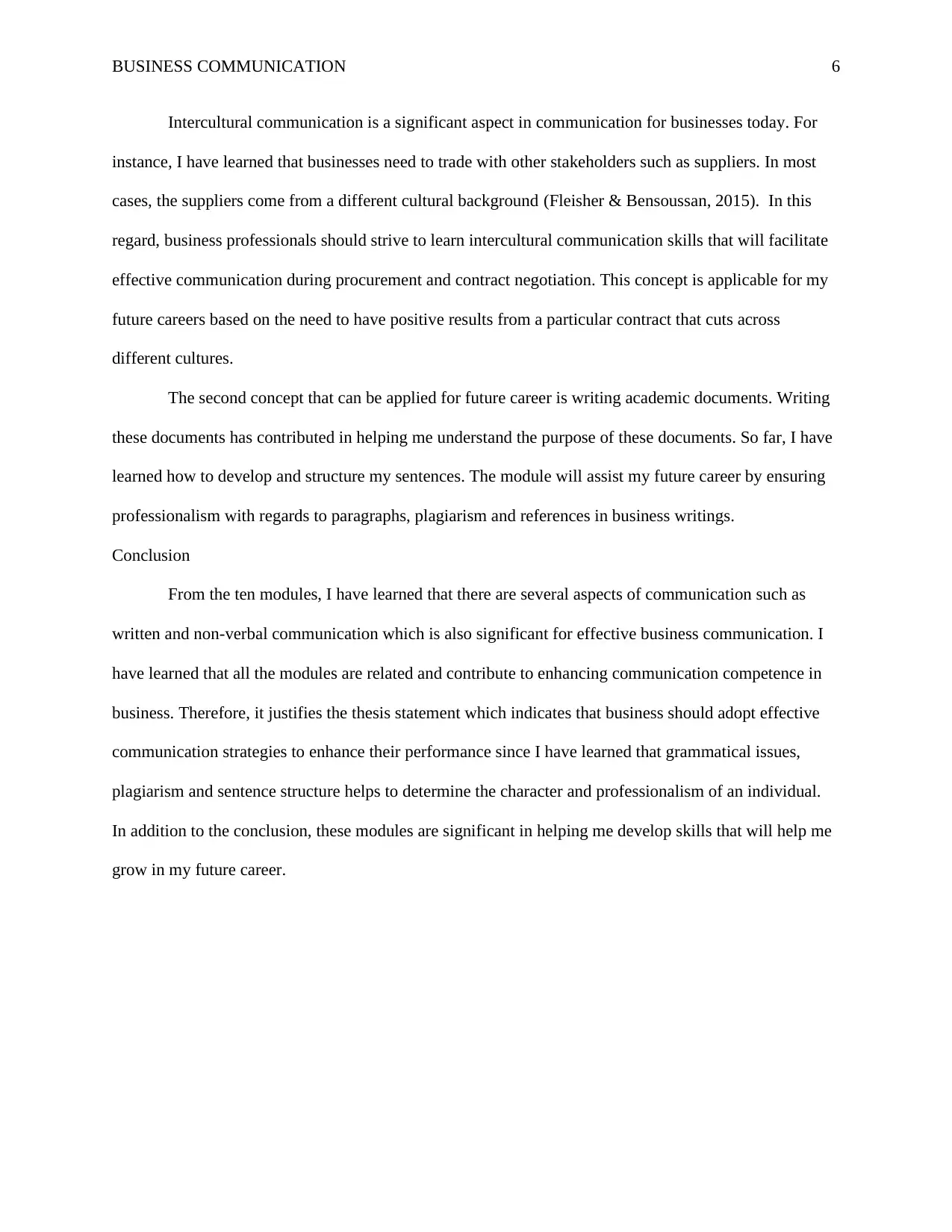
BUSINESS COMMUNICATION 6
Intercultural communication is a significant aspect in communication for businesses today. For
instance, I have learned that businesses need to trade with other stakeholders such as suppliers. In most
cases, the suppliers come from a different cultural background (Fleisher & Bensoussan, 2015). In this
regard, business professionals should strive to learn intercultural communication skills that will facilitate
effective communication during procurement and contract negotiation. This concept is applicable for my
future careers based on the need to have positive results from a particular contract that cuts across
different cultures.
The second concept that can be applied for future career is writing academic documents. Writing
these documents has contributed in helping me understand the purpose of these documents. So far, I have
learned how to develop and structure my sentences. The module will assist my future career by ensuring
professionalism with regards to paragraphs, plagiarism and references in business writings.
Conclusion
From the ten modules, I have learned that there are several aspects of communication such as
written and non-verbal communication which is also significant for effective business communication. I
have learned that all the modules are related and contribute to enhancing communication competence in
business. Therefore, it justifies the thesis statement which indicates that business should adopt effective
communication strategies to enhance their performance since I have learned that grammatical issues,
plagiarism and sentence structure helps to determine the character and professionalism of an individual.
In addition to the conclusion, these modules are significant in helping me develop skills that will help me
grow in my future career.
Intercultural communication is a significant aspect in communication for businesses today. For
instance, I have learned that businesses need to trade with other stakeholders such as suppliers. In most
cases, the suppliers come from a different cultural background (Fleisher & Bensoussan, 2015). In this
regard, business professionals should strive to learn intercultural communication skills that will facilitate
effective communication during procurement and contract negotiation. This concept is applicable for my
future careers based on the need to have positive results from a particular contract that cuts across
different cultures.
The second concept that can be applied for future career is writing academic documents. Writing
these documents has contributed in helping me understand the purpose of these documents. So far, I have
learned how to develop and structure my sentences. The module will assist my future career by ensuring
professionalism with regards to paragraphs, plagiarism and references in business writings.
Conclusion
From the ten modules, I have learned that there are several aspects of communication such as
written and non-verbal communication which is also significant for effective business communication. I
have learned that all the modules are related and contribute to enhancing communication competence in
business. Therefore, it justifies the thesis statement which indicates that business should adopt effective
communication strategies to enhance their performance since I have learned that grammatical issues,
plagiarism and sentence structure helps to determine the character and professionalism of an individual.
In addition to the conclusion, these modules are significant in helping me develop skills that will help me
grow in my future career.
⊘ This is a preview!⊘
Do you want full access?
Subscribe today to unlock all pages.

Trusted by 1+ million students worldwide
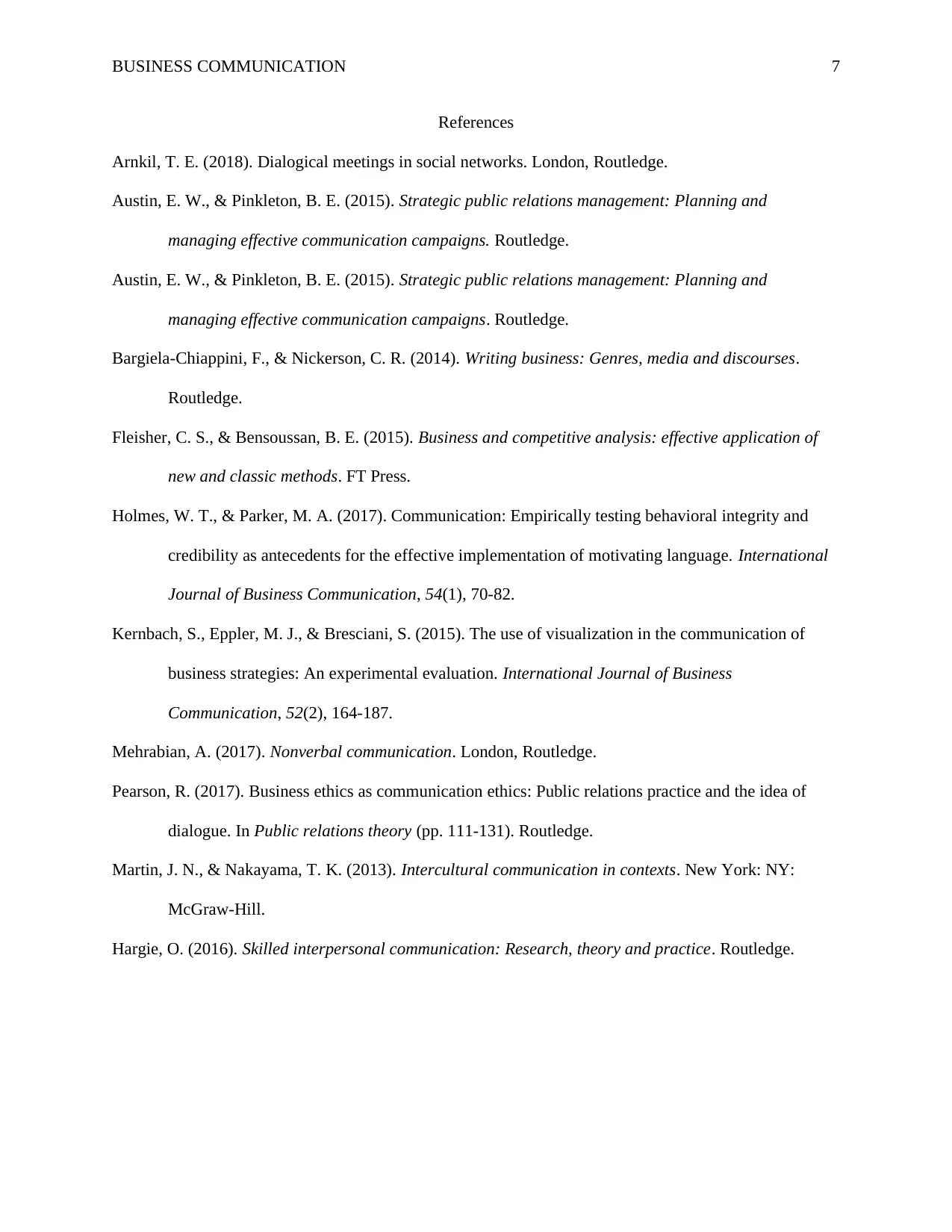
BUSINESS COMMUNICATION 7
References
Arnkil, T. E. (2018). Dialogical meetings in social networks. London, Routledge.
Austin, E. W., & Pinkleton, B. E. (2015). Strategic public relations management: Planning and
managing effective communication campaigns. Routledge.
Austin, E. W., & Pinkleton, B. E. (2015). Strategic public relations management: Planning and
managing effective communication campaigns. Routledge.
Bargiela-Chiappini, F., & Nickerson, C. R. (2014). Writing business: Genres, media and discourses.
Routledge.
Fleisher, C. S., & Bensoussan, B. E. (2015). Business and competitive analysis: effective application of
new and classic methods. FT Press.
Holmes, W. T., & Parker, M. A. (2017). Communication: Empirically testing behavioral integrity and
credibility as antecedents for the effective implementation of motivating language. International
Journal of Business Communication, 54(1), 70-82.
Kernbach, S., Eppler, M. J., & Bresciani, S. (2015). The use of visualization in the communication of
business strategies: An experimental evaluation. International Journal of Business
Communication, 52(2), 164-187.
Mehrabian, A. (2017). Nonverbal communication. London, Routledge.
Pearson, R. (2017). Business ethics as communication ethics: Public relations practice and the idea of
dialogue. In Public relations theory (pp. 111-131). Routledge.
Martin, J. N., & Nakayama, T. K. (2013). Intercultural communication in contexts. New York: NY:
McGraw-Hill.
Hargie, O. (2016). Skilled interpersonal communication: Research, theory and practice. Routledge.
References
Arnkil, T. E. (2018). Dialogical meetings in social networks. London, Routledge.
Austin, E. W., & Pinkleton, B. E. (2015). Strategic public relations management: Planning and
managing effective communication campaigns. Routledge.
Austin, E. W., & Pinkleton, B. E. (2015). Strategic public relations management: Planning and
managing effective communication campaigns. Routledge.
Bargiela-Chiappini, F., & Nickerson, C. R. (2014). Writing business: Genres, media and discourses.
Routledge.
Fleisher, C. S., & Bensoussan, B. E. (2015). Business and competitive analysis: effective application of
new and classic methods. FT Press.
Holmes, W. T., & Parker, M. A. (2017). Communication: Empirically testing behavioral integrity and
credibility as antecedents for the effective implementation of motivating language. International
Journal of Business Communication, 54(1), 70-82.
Kernbach, S., Eppler, M. J., & Bresciani, S. (2015). The use of visualization in the communication of
business strategies: An experimental evaluation. International Journal of Business
Communication, 52(2), 164-187.
Mehrabian, A. (2017). Nonverbal communication. London, Routledge.
Pearson, R. (2017). Business ethics as communication ethics: Public relations practice and the idea of
dialogue. In Public relations theory (pp. 111-131). Routledge.
Martin, J. N., & Nakayama, T. K. (2013). Intercultural communication in contexts. New York: NY:
McGraw-Hill.
Hargie, O. (2016). Skilled interpersonal communication: Research, theory and practice. Routledge.
1 out of 7
Related Documents
Your All-in-One AI-Powered Toolkit for Academic Success.
+13062052269
info@desklib.com
Available 24*7 on WhatsApp / Email
![[object Object]](/_next/static/media/star-bottom.7253800d.svg)
Unlock your academic potential
Copyright © 2020–2026 A2Z Services. All Rights Reserved. Developed and managed by ZUCOL.



